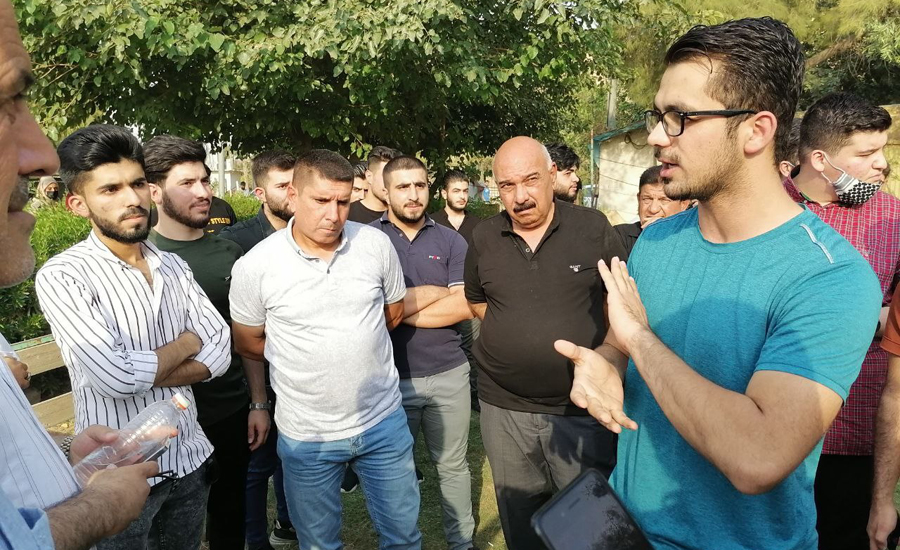In each Kurdish examination hall, about half or more of the students left the examination halls in Kirkuk due to the “external and abandoned” questions in the final ministerial exams.
According to a member of the Iraqi parliament from Kirkuk, 40 marks worth of question were not part of the curriculum.
The problem occurred in the examination halls of grade twelve during chemistry test for Kurdish schools which caused panic among students, half of them forced to leave exam halls. Later, some of the students and their relatives gathered in front of the Kirkuk citadel for this purpose.
Alan Rahman, a grade 12 student, told KirkukNow that the problem was repeated every year in Kurdish education under the Iraqi Ministry of Education MOE, but this year the problem was bigger in chemistry.
This problem persists every year in Kurdish education under the Iraqi Ministry of Education
"In the hall where we had the exam, 55 out of 160 students left the hall after seeing the questions," Rahman said.
Dr. Fuad Ahmad, the supervisor of chemistry lessons in the Kirkuk General Directorate of Education – Kurdish Studies Department, told Kirkuk Now, “This problem is repeated every year in chemistry lessons. They make students anxious and leave the exam hall.”
The supervisor, after seeing the questions, announced his resignation as a position.
Video: Students, their relatives and teachers gather in front of Kirkuk Castle.
"I have discussed these issues with the director of Kurdish education and the supervisors’ unit several times, but they have not been resolved and repeated every year, so I resigned," he said.
“I was supervising an examination hall with 140 students. 23 students did not attend and 52 students left the hall,” he said.
The successive wars and disputes have affected education sector as most of the schools teaching in Arabic language, the main language of the country, are funded by the federal government in Baghdad while those teaching in Kurdish are supported by the Kurdistan Regional Government KRG.
The deterioration of public services and sectors have pushed investors to launch private schools, local and international, which was warmly welcomed by middle and high classes all over Iraq, in particular the Kurdistan region of Iraq KRI.
"The questions worth 40 marks were out of the program. Those who prepare the tests are accountable," Omid Mohammed, an MP of New Generation bloc in the Iraqi parliament, said during the protests in Kirkuk, without providing any credible evidence.
40 marks worth of questions were out of the program
He expressed his readiness to visit Baghdad with teachers and student representatives to compensate them.
"This problem is repeated every year and must be solved.”
No complaints were reported about questions of the same subject in Arabic and Turkmani.
Sherzad Rashid Kaka, director of Kurdish education in the Kirkuk General Directorate of Education, told Kirkuk Now, “Yes, some people say that external questions were noticed and we asked the expert Kurdish committee in the ministry to file a report to the ministry.
“The committee invites the teachers who prepared the tests and if the external or abandoned questions were included in the test, then any student who answered the question incorrectly will be considered correct.”
The Ministry of Education has not yet commented on the matter.
Early June, The Iraqi ministry of education has ordered installation of surveillance cameras at the offices of public-school principals to monitor abnormal moves such as loss of documents, leakage of exam questions, or any other problems related to the treatment of school administration with students and their relatives.
The decision coincided with the leakage of the questions of the grade nine’s final national examination and its circulation on social media networks, especially mathematics questions, pushing the examination supervision committee of the MOE postponed the examinations.
Education in Iraq used to be one of the best education systems in the region yet decades of conflict and under-investment in Iraq have destroyed the system. Iraq’s national budget has in the past years allocated less than 6% of its national budget to the education sector, placing Iraq at the bottom rank of Middle East countries.
Iraq’s infrastructure is in ruins in many parts of the country; one in every two schools is damaged and needs rehabilitation. A number of schools operate in multiple shifts in an attempt to accommodate as many students as possible, squeezing the little learning time that children have, a report by the UNICEF about education in Iraq has found in 2016.





